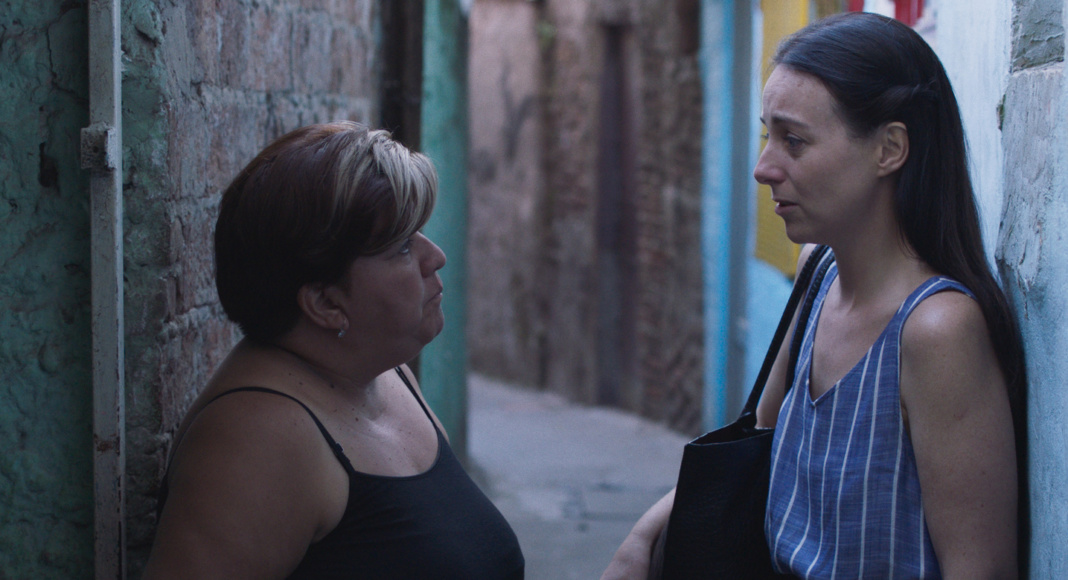This atmospheric film weaves together the spectre of The Disappeared of the past with the all-too-frequent police murders of contemporary news stories.
The film is available via Virtual Cinemas and On Demand across the UK: https://vimeo.com/ondemand/acommoncrime
Un Crimen Común follows a middle class academic mother whose life unravels after she becomes implicated in the death of her housekeeper’s son. We see the protagonist Cecilia living a life of relative success and comfort in the suburbs of Buenos Aires, and enjoying a friendship with her housekeeper, Nebe. However, Cecilia becomes uncomfortable when Nebe brings over her baseball cap-wearing teenage son, Kevin. She turns away when a young man resembling Kevin is dragged out of the fairground by uniformed officers. Later at night during a rainstorm, when a terrified Kevin bangs on the doors of Cecilia’s house, she hides, refusing to let him in.
The next day, Cecilia returns to news coverage of a body found right by her house. She goes to the location where the body was found, and where an angry crowd has already gathered and is quickly dispersed by the police, and we see her choking in clouds of tear gas. It becomes evident that the body is Kevin, as Cecilia visits the labyrinthine barrio where Nebe and her grief-stricken community gather in mourning for Kevin. Nebe reveals that the police had been harassing Kevin for a long time, and Cecilia doesn’t confess to her about her son’s visit to her house on the night that he died, paying her her wages for the month instead.
This theme, juxtaposing the lives of the relatively wealthy with those of their domestic servants, has been well-worked in contemporary Latin American film – think of Roma or La Nana. As Carlos Aguilar has commented, ‘Contemporary filmmakers are aware of their own social class and, there is a clear sense of guilt in some of their films’.
Un Crimen Común is the latest film by director Francisco Márquez, who is part of the filmmaking collective of directors and producers named Thinking with the Hands, whose projects combine creative use of light and sound with socio political and historical themes. He had already depicted the guilt of inaction and the plight of The Disappeared in the film The Long Night of Francisco Sanctis about an apolitical man who receives information that two of his neighbours will be disappeared by the military during the years of the Junta, and faces the choice of whether to intervene, putting himself at risk. Other notable works from Márquez include documentaries like Después de Sarmiento, about social inequality in the education system and Niña Mama, about the plight of teenage girls who find themselves with an unwanted pregnancy.
During A Common Crime, Cecilia begins to fall apart mentally, convinced that she is haunted by Kevin’s ghost. However, the director avoids the trappings of horror films, such as jump scares and ghostly shadows, to suggest that Cecilia is instead haunted by the greater psychological guilt of her own inaction, and that the consequences have led to the death of someone marginalised in society.
Cecilia herself begins to question her purpose as an Economics lecturer, confiding in a colleague that her course content is shallow, to which her colleague replies ‘you were the one pushing for those texts.’ She also starts drinking red wine very often, recalling religious themes of confession at mass and harbouring guilt. The blue clothes that Cecilia sometimes wears, the cold blue lighting and Cecilia’s own bright blue eyes, recall the icon of idealised motherhood: the Virgin Mary. In contrast, the numerous plants that decorate the courtyard of Nebe’s home suggest a closer-to-Earth, nurturing, more natural symbolism of motherhood.
It is often hinted that the neighbourhood in which housekeeper Nebe lives is a dangerous place: a taxi driver refuses to drive Cecilia close to where Nebe lives, and Nebe commands one of her sons to escort Cecilia back out of the neighbourhood when she visits the first time, yet we never see Cecilia face any actual danger. It is in fact teenagers like Kevin who are put in harm’s way, harassed and frequently murdered by the police. We are left with the impression that people like Cecilia can move on from the consequences of police violence, however people like Nebe are faced with the burden of grief, and an often futile struggle for justice.
Un Crimen Común is available via Virtual Cinemas and On Demand across the UK: https://vimeo.com/ondemand/acommoncrime
Watch our Q&A with director, Francisco Márquez and lead talent, Elisa Carricajo:


